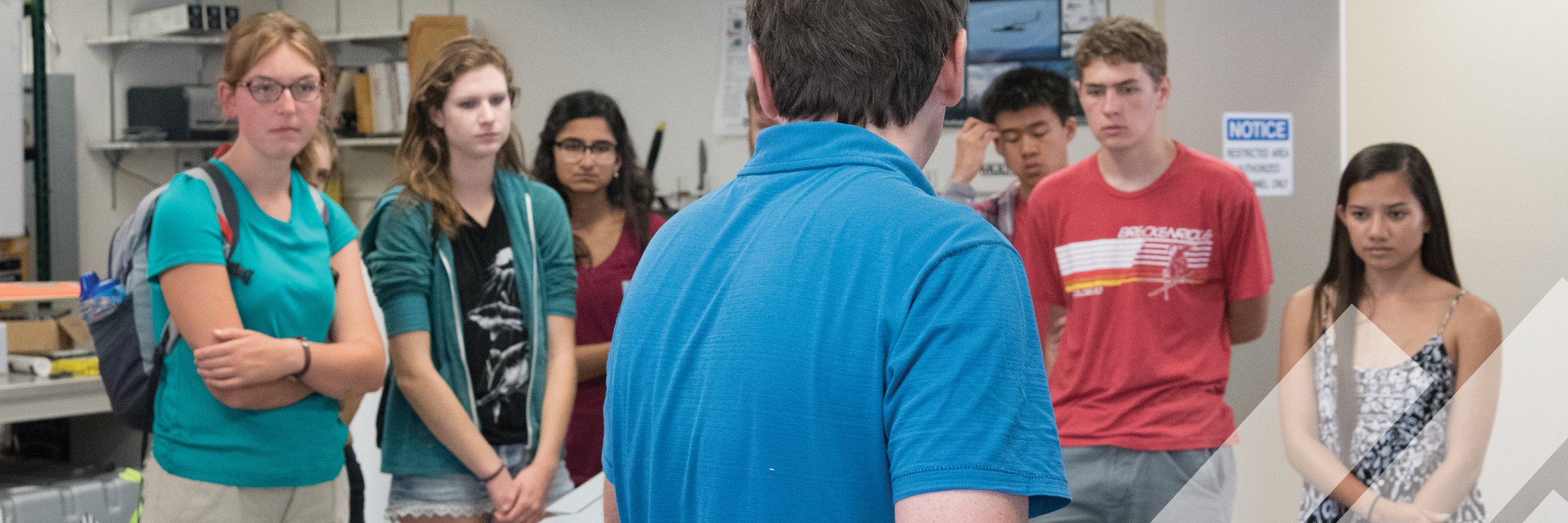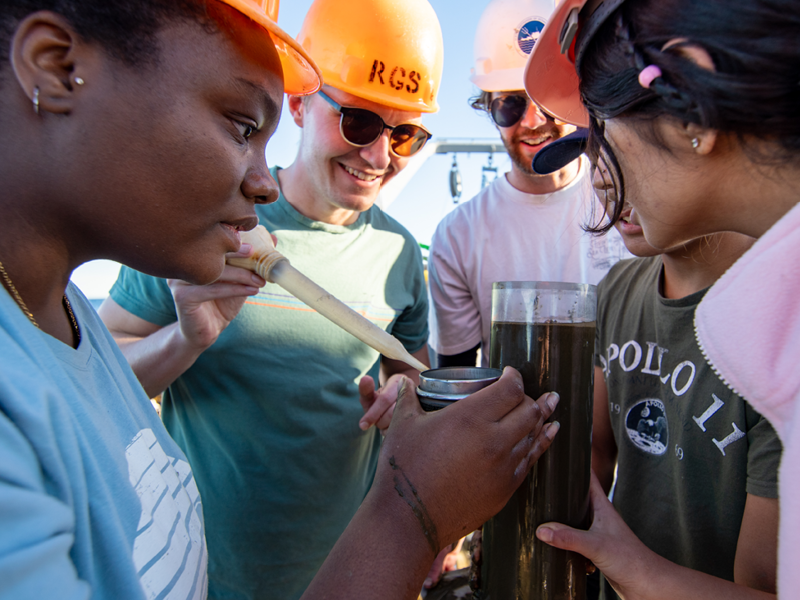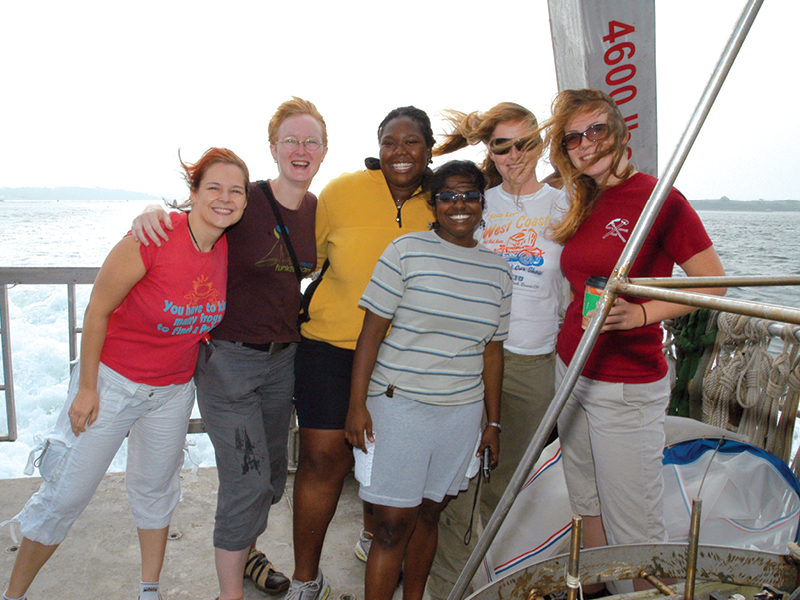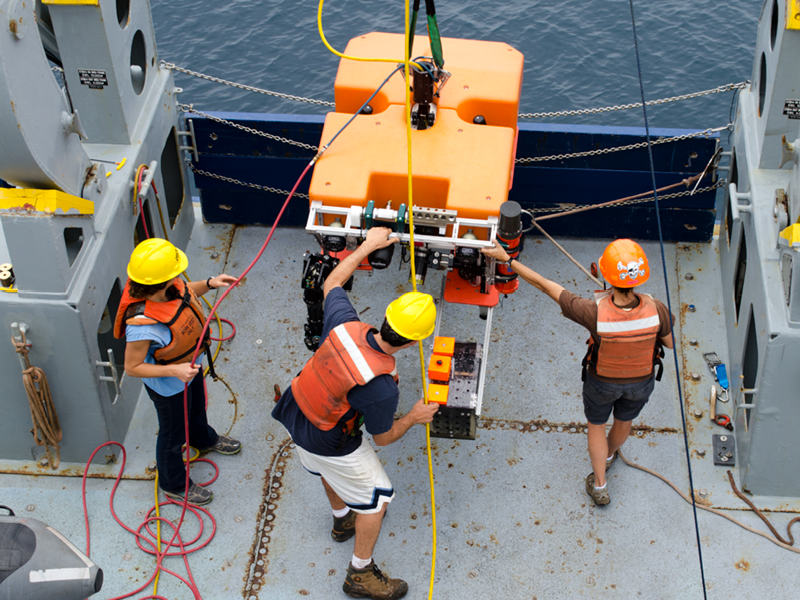
DID THE INTERNSHIP MEET YOUR EXPECTATIONS?
“My supervisor won my heart in the first hour, and as I got to know the other PIs, grad students, and postdocs in my lab, I knew it was going to be a good summer. Everyone was friendly and welcoming to the three green thumbs who had just landed in their lab and didn't know the difference between a servo motor and a zener diode. Our supervisor wanted us to understand the fundamentals of what we were doing and why it was important. When work needed to be done, we got it done. But if the waves were good, the whole lab was out in the water catching them together. I never thought getting dropped in on by my boss on a wave could feel so good. Overall, this summer blew my expectations out of the water. I couldn't have asked for a better experience.”
“I got valuable (PAID!) research experience, tips on applying to grad school, cool tours of others' labs, and work by the beach! Doesn't get much better than that!”
"I was excited every day to come to work because I was doing work that I felt was interesting and important, and I got enough guidance that I was able to actually make progress in projects that I would generally consider over my head. I learned a lot and made some great friends."
"I got to work with real world data, and my data was particularly interesting because it was very recent and it was the first experimental data collected in its geographical area. Being in a research environment, I learned a lot more here about my academic interests than I did when I interned in industry. Also, unlike my internship in industry, there was never a slow day where I wanted to go back home.”
"My lab provided a good amount of autonomy but still gave me plenty of guidance and support with my project. This has been such a fantastic learning experience and has given me a broader perspective of the field of oceanography. I couldn't have asked for a better location or group of people to spend the summer with."


WAS YOUR ACADEMIC BACKGROUND HELPFUL DURING YOUR INTERNSHIP?
“As an engineering intern, I had a very hands-on experience. Intro to Engineering Graphics and Design (MAE3) was a good class to have taken prior to this internship. In that class, you design and build a robot to compete against other teams, picking up balls and putting them in a basket, stacking boxes, etc. Working through the engineering process with a team, from rough concept to physical construction and adjustment gave me a feel for how to make an idea into a real thing and I got to apply that during my internship. We worked on and built whatever the lab needed including a test rig and program for a hydroelectric turbine, a vacuum table for a CNC router, and a rolling cart and test rig for a time-of-flight velocimeter. We applied principles of design and teamwork to make those things and sometimes they didn't work and we had to make them again. But the process of creating something with the tools at your disposal with the people around you is an important one, and MAE 3 prepared me well for it. Standard math and science courses provided a solid foundation although there wasn't any rigorous math or science in the work we did. Knowing Ohm's law and Newton's laws of motion helps to get started in the right direction. Years of those kinds of classes get your brain used to working in a logical framework, which is the way you need to think to do good science."
“Taking advanced math classes and being an engineering student with computational/coding experience helped me with my project in ocean acoustics. My final project included knowing how to use MATLAB and that made everything so much easier because I did not have to learn an entirely new language.”
“A biological statistics class I took was especially helpful because I learned quite a bit of coding, which came in handy. Previous lab experience also was helpful in that I came into the internship feeling comfortable with the lab environment.”
“My coding experience was definitely instrumental to my success this summer. Any background knowledge of signal processing was also helpful but my supervisors did not expect me to come into this project knowing much about the material which was comforting."
“My coding experience and physics background were easily the most helpful background knowledge that I had coming into this internship.”
“My marine science background helped my overall understanding of the research I did here.”
"My environmental studies background helped provide context for the work I was doing, especially the courses I took related to marine biology."
"I wrote several projects for computer science courses and some other mini research projects, which gave me the skills needed to conduct my own independent research. My soldering and electrical wiring skills were also useful."
"I felt very confident in working with GPS data and surveying equipment because of my academic background. I also felt like I could critically think through problems to solve during my internship."
"Nearly everything was learnable during the internship, as long as I was willing to put in the effort and not say 'I don't have time to learn that.' It was helpful that I knew a bit of Matlab and that I read up on bubble dynamics before coming."
"My basic engineering and handywoman skills were helpful for testing equipment. Additionally, my data analysis skills in Excel and statistical knowledge were helpful."
"My major classes (Signals & Systems, Computational Methods with MATLAB, Mathematical Physics, etc.) gave me the background knowledge I needed to get started in my project since it involved wave interaction with structures and signal processing. Also, my project team experience prepared me with working with 3D printers as well as interacting with other people from different technical backgrounds in a project."
HAS THIS INTERNSHIP HELPED DEFINE YOUR FUTURE GOALS?
“When people ask me what I want to do after college with mechanical engineering I usually tell them that I have no idea. But this summer has opened my eyes to the world of academia and what my life might look like if I decide to go to grad school. Being surrounding by intelligent, curious, and adventurous people is energizing. Everyone here is excited about what they're doing which is great to see. I can picture myself at Scripps as a grad student and it's a good picture.”
“This internship has convinced me that I want to pursue marine science in graduate school. What really convinced me was, every other job I have done there have been mornings that I didn't want to go to work. During this internship I have always been excited to go to work, and it really made the decision about graduate school easy.”
“The MPL internship program has been a great experience. Everyone is very friendly and the work environment is amazing and super laid-back. It's hard not to feel motivated every day at work when you're so close to such smart and dedicated people. Over the course of these ten weeks, I've learned so much about engineering and oceanography just by talking to people in my lab every day. The weekly talks and lab tours were also a wonderful supplement to the internship experience and they're a nice opportunity to learn about other types of research that are going on outside of your lab.”
“Coming into this internship I had no idea that oceanography was an area of science in which I could apply physics, it was never on my radar. Now it is and I've found it super interesting! Possibly enough to consider studying this in the future.”
“Will definitely be applying to SIO, either for a job or for grad school.”
“It definitely has helped me narrow down my graduate school focus, as studying plate tectonics and earthquakes is now an option I may pursue.”
“This internship really supported my love for oceanography. I had way more fun working here than doing schoolwork, even though my schoolwork is oceanography! This internship made me realize I want to continue studying oceanography, and introduced me to the field of using computer models to study oceanographic processes.”
“The internship gave me a better idea what to expect in graduate school and how to go about applying. This aspect of the internship helped me define my goals and path for the future. Reaching out to faculty and graduate students was a great way to learn more about the process and current research going on.”
“This internship helped me realize that the environment and the people that I work with are just as important as the work I am doing. I would welcome the opportunity to work as an engineer at Scripps."
"This experience has deepened my interest in physical oceanography, which was the area I wanted to learn about when I applied, but the experience has also made me interested in oceanographic engineering, marine optics and acoustics. The internship has reminded me that I should keep an open mind about what areas of research I want to pursue."


WOULD YOU RECOMMEND THE MPL INTERNSHIP PROGRAM TO OTHERS?
“Learn what it's like to work in a lab. Meet rad people. Go surfing with your boss.”
“The MPL internship gives the intern the opportunity to work with some of the top scientists in the world while experiencing what it is like to participate in research.”
“The internship is with the top oceanography institution in the world and the advisers are not only geniuses but also very welcoming and patient while teaching us.
“The program gives you a lot of freedom and you learn what you want to learn, you do what you want to do. You go on field trips and lab tours. You work where people go to vacation. This place is awesome.”
“It's very well organized and the culture is relaxed. There's a lot to learn about not only at SIO but also at the main campus of UC San Diego. Additionally, San Diego is a nice area with a lot of urban and outdoors attractions.”
“In addition to the location, I highly recommend this internship because of the flexibility of the program. The principal investigators really care about what the students' interests and strengths are. This program is very much prioritized around the intern and everyone has been so supportive. The people at Scripps really care about what you want to get out of these 10 weeks and will help you accomplish whatever that may entail.”
WHAT WERE YOUR INTERNSHIP RESPONSIBILITIES?
“Data analysis, basic mechanical maintenance on a wave glider, learned the basics of acoustics, and became more aware of the tasks and requirements of an engineer when on the water.
“Design and fabricate a cart for an AUV, help out staging equipment that goes out to sea, help make wings for an airdropped buoy.”
“Three-dimensionally digitizing marine specimen.”
“Log blue whale D calls using an automatic detector. Analyze logged calls for patterns with respect to mid-frequencyactive sonar.
“Designed and manufactured a prototype power-generation device, using SolidWorks to construct 3D models of hydrofoils to be created with a 3D printer."
"Logged data from a hydrophone channel near the Little Cayman Island and processed that data to discover trends in Nassau Grouper and other Grouper species breeding.”
“I used various engineering skills in my research to find out if the Wave Glider could record the ocean current speed and direction while performing its mission. I determined the Wave Glider could also calculate the significant wave height of the ocean environment it was operating in.”
"Designing and manufacturing support structure for an inertial sensor and GPS that will be placed in a buoy, to be used to determine when surface chop is high.”
"I was tasked with designing and implementing a machine learning algorithm to analyze the large amount of image data that has been collected by our lab. I also assisted with preparing for hardware deployments at sea."
"I helped create probes for the epsilometer and helped design things for my supervisors, engineers, and scientists in the lab whenever they needed a part or device made. After I designed those objects, I would use the tools provided in the lab to create them."

